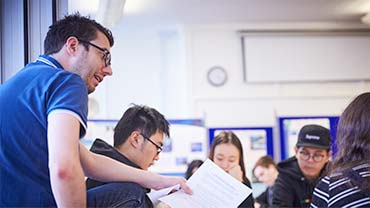Teaching methods
 Professional chemists need to be able to make connections between topics in separate subjects. They need to think through problems in a clear and logical manner, find the most efficient way of analysing or synthesising compounds and clearly explain their views or conclusions to people.
Professional chemists need to be able to make connections between topics in separate subjects. They need to think through problems in a clear and logical manner, find the most efficient way of analysing or synthesising compounds and clearly explain their views or conclusions to people.
Our teaching staff will help and encourage you to develop these skills by providing you with a variety of learning opportunities, such as lectures, tutorials, workshops, exams, laboratory reports, essays, oral presentations, poster design and problem based learning.
Lectures
Lectures form an essential part of your university teaching. Lecture styles may vary considerably and may include web-based delivery, demonstrations/animations, as well as the traditional 'chalk and talk' lecture. Most lectures will also be video captured so you can re-watch a lecture and annotate your lecture notes further.
Self-study
A vital part of university learning is self-study. You will be expected to dedicate a considerable amount of private study time each week to answering problem sheets, writing laboratory reports and reading around the different courses you will be taking.
Personal tutor
All new students are allocated a personal tutor immediately on arrival. This is a member of the academic staff in the Department of Chemistry who acts as a personal confidante during your time as an undergraduate. All our students are provided with a comprehensive set of materials and resources to ensure they get the most out of their degree.
Tutorials
We place a strong emphasis on small group tutorials. These consist of 5-7 students meeting with a member of the academic staff to discuss questions arising from the lectures. Tutorials give you an ideal opportunity to discuss any problems you have with your understanding of your course content, and they also give you the chance to get to know some of the other members of staff in the Department.
Problem classes
Like tutorials, these usually revolve around a series of problems. However, in contrast to tutorials, the problem sheets are solved by dividing the class into small groups of students. Teamwork makes these sessions an enjoyable learning experience.
Laboratory classes
Chemistry is a very practical subject, and so strong emphasis is placed on the acquisition of laboratory skills. To help with your confidence, familiarity and understanding of laboratory practicals, you will have access to a range of short instructional video clips that we have prepared in order to guide you through the experimental techniques before you go into the laboratory.
If you have any specific questions about our teaching methods, please contact us.